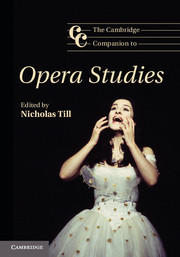Book contents
2 - The business of opera
from Part One - Institutions
Published online by Cambridge University Press: 05 December 2012
Summary
The purpose of a business is to make a profit. Opera has a reputation as one of the most effective methods yet invented of losing money. A connection between the two is surely a contradiction in terms?
Daniel Snowman, in his Social History of Opera series for the BBC, argued that the history of opera tells the story of who picks up the deficit. Private or public funders; idealistic artists or intrepid entrepreneurs; individuals or consortia: these are the players with the power to shape the way opera is made. Nor is it a story with a straightforward chronological progression from a primitive example to the complex model(s) of today. At different times during opera’s four centuries and in different places, different practices may be contrasted. Sometimes they are locked in combat, at others one or other is in the ascendant. While there is no blueprint of best practice, judgements may be made as to how well the opera business adapted itself to the needs of its creative forces. And questions may be asked about how the opera has been moulded to the needs of the business.
- Type
- Chapter
- Information
- The Cambridge Companion to Opera Studies , pp. 53 - 69Publisher: Cambridge University PressPrint publication year: 2012
References
- 1
- Cited by



